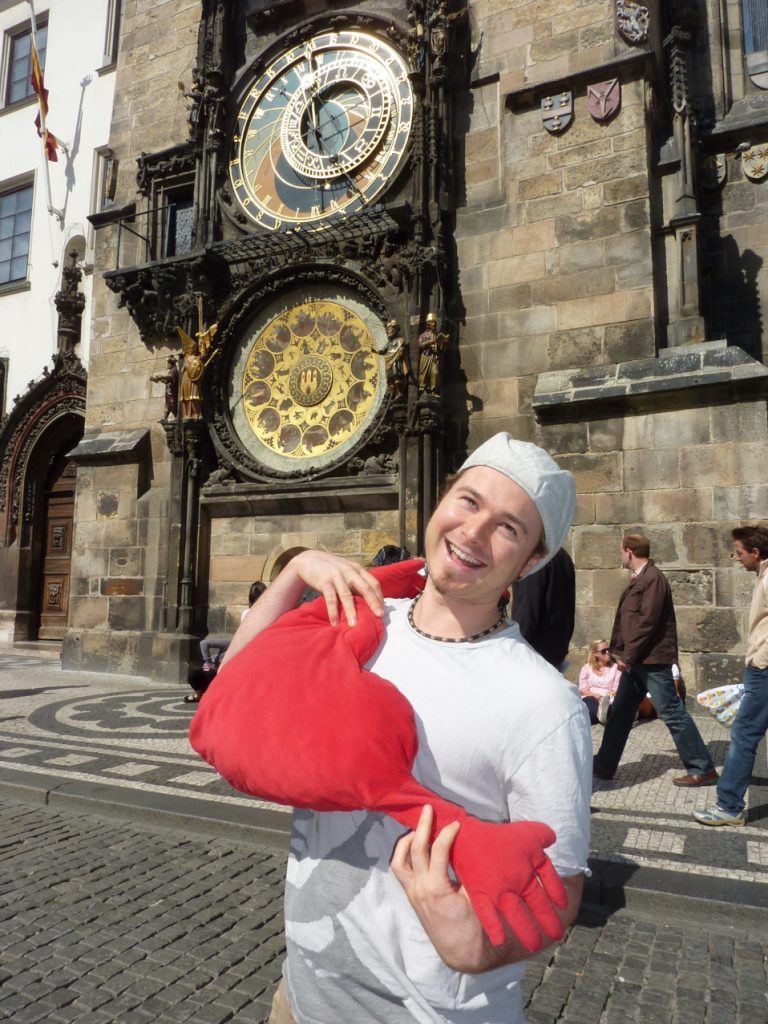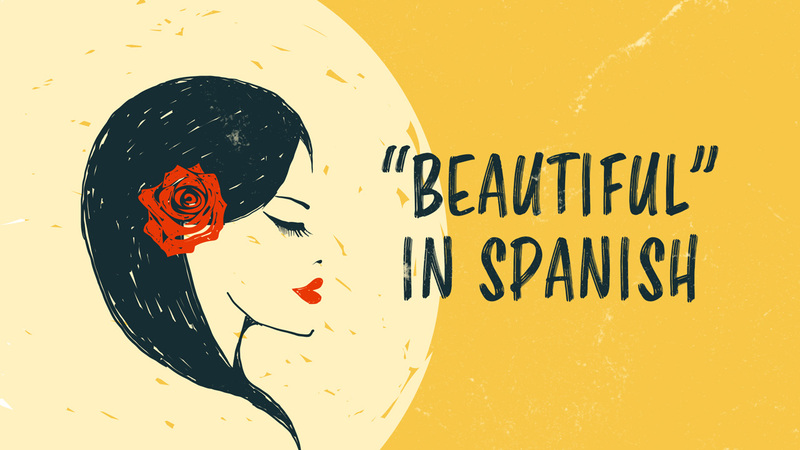15 Romantic Words for “Beautiful” in Spanish
Spanish is a beautiful language, with a lot of words to describe beauty. But would you know how to tell your Spanish-speaking valentine how attractive they are?
There are many ways in Spanish to say “beautiful”, just like there are many ways to say it in English: “attractive”, “handsome”, “good-looking”, “pretty”, “cute”, “hot”, “fit”, “sexy”, and so on.
In this article, I will show you some of the most common Spanish adjectives for “beautiful”, and explain how you can use them like a native Spanish speaker.

Table of contents
- 1. Bello / Bella – “Beautiful”
- 2. Bonito / Bonita – “Pretty” or “Nice”
- 3. Guapo / Guapa – “Handsome”
- 4. Lindo / Linda – “Lovely”
- 5. Bueno / Buena – “Good Looking”
- 6. Hermoso / Hermosa – “Gorgeous”
- 8. Radiante – “Radiant”
- 9. Precioso / Preciosa – “Gorgeous” or “Lovely”
- 10. Rico / Rica – “Cute” or “Sexy”
- 11. Mono / Mona – “Pretty”
- 12. Macizo / Maciza – “Hot”
- 13. Bombón – “Sweet Like Chocolate”
- 14. Sexy / Sexi – “Sexy”
- 15. Estar Como un Queso – “To Be Like a Cheese”
- A Warning About “Hot” in Spanish
- You’re Now the Master of Beauty in Spanish
Before we get into the article, if you are interested in learning Spanish yourself, you should check out my absolute favourite resource for learning Spanish, SpanishPod101.
Every time I refresh my Spanish, this has been by far my favourite resource, since it’s a podcast style learning resource that covers many aspects of the language much better than traditional courses do.
It also tackles the issue of listening comprehension better than literally anything else out there, since its catalogue of lessons eases you in with simple lessons at first that get progressively harder, and you can listen to them for a huge range of topics better suited to your hobbies and interests.
They have a free option for anyone who wants to test them out, based on just their limited recent episodes, but exclusively for Fi3M readers, you can get 20% off if you sign-up for any of their subscriptions, which allow you to access their full catalog of many hundreds of lessons, using the code FLUENT3.
I highly recommend this to all Spanish learners!!
1. Bello / Bella – “Beautiful”
Bello/bella is a safe, all-purpose word that you can use to mean “beautiful” or “lovely”. It’s a bit formal, especially in Spain, but it can describe anything: beautiful people, beautiful clothes, a beautiful view, a beautiful mind.
There’s also a closely-related noun belleza, which means “beauty”.
2. Bonito / Bonita – “Pretty” or “Nice”
Bonito / bonita also means “beautiful”, but it’s not quite as strong as bello. It’s closer to “pretty” or “nice”.
This adjective is more common than bello and, like bello, can describe anything – not just a person.
Just be careful if you see bonito on a menu. When used as a noun, the word refers to a type of fish that’s similar to tuna (and has the same name in English).
3. Guapo / Guapa – “Handsome”
Guapo/guapa is a word with some regional variations. Most commonly, it describes an attractive person, especially male, and isn’t really used for beautiful objects or places.
In some regions of Spain, however, guapo is used more liberally. As well as meaning “attractive” when describing a person, more generally it can mean something like “cool” or “awesome”.
In other places, guapo can mean “brave” or “bold”. In some parts of Latin America it can even mean a “bully” or “braggart”. One Puerto Rican commenter says that where he’s from, calling a man guapo “could definitely cause a fight.”
You know how the word “handsome” in English is only really used for men, not women? Guapo is a bit like that, but not quite as strong. You do hear women being called guapa, but it’s more common to hear them being called bonita. Men, on the other hand, are more likely to be called guapo than bonito.
4. Lindo / Linda – “Lovely”
Lindo/linda is more common in Latin America than Spain (and is also very common in Brazilian Portuguese). It’s similar in meaning to bonito/bonita: it can mean “beautiful”, “pretty”, “lovely”, or “nice”.
In Latin America you can also use lindo as an adverb. For example, ella canta lindo means “she sings beautifully.”
5. Bueno / Buena – “Good Looking”
You’ve surely come across bueno/buena before, as it’s one of the most common Spanish adjectives. Actually, it’s one of the most common words – in the Spanish language.
Bueno usually means “good”, but it has some hidden tricks. If I told you about a girl I know who is buena, what do you think it means?
To quote Bill Clinton, it depends on what the meaning of the word “is” is. Remember that “is” in Spanish can be está (from estar) or es (from ser).
Ella es buena, means she’s “good” in the sense that she’s a good person. She’s moral, virtuous, and does the right thing. Similarly, ella es malo means “she’s (a) bad (person)”.
On the other hand, if I said ella está buena, I’m saying that she’s good-looking. If I want to hammer the point home, I could even say ella está bueníssima – she’s very attractive.
6. Hermoso / Hermosa – “Gorgeous”
Another common word, hermoso/hermosa is used for beautiful people, places, and things. It’s a bit more wide-ranging than bello – translations include “beautiful”, “gorgeous”, “nice”, or even (in Latin America) “noble”.
Remember that bello had a noun cousin called belleza? Hermoso has a similar relationship with hermosura, which means “beauty”. You can also say una hermosura to mean “a beautiful woman”.
##7. Atractivo / Atractiva – “Attractive”
You guessed it – atractivo/atractiva means “attractive”. You can use it in pretty much the same way as in English, for people, places, or things.
El atractivo is also a masculine noun meaning “attraction”, “appeal”, or “charm”.
8. Radiante – “Radiant”
Another word that’s similar to the English – radiante means “radiant” or “beaming”.
It’s not just limited to describing people. For example, una mañana radiante means “a radiant/beautiful morning”.
9. Precioso / Preciosa – “Gorgeous” or “Lovely”
You can call a person, place or thing precioso/preciosa. It means they’re “gorgeous” or “lovely”. The English cognate “precious” can make sense too. For example, a diamante (“diamond”) is a piedra preciosa (“precious stone”).
10. Rico / Rica – “Cute” or “Sexy”
Rico/rica usually means “rich”, or “wealthy”. When describing food, it also means “tasty” or “delicious”.
However, rico/rica can also be used with people, places, and things to mean “lovely” or “cute”. If you use estar to say that a person is rich – e.g. él está rico, it can also be understood to mean “sexy”.
11. Mono / Mona – “Pretty”
As a noun, mono means “monkey” – but it’s not (necessarily) offensive to call a person mono or mona. When used as an adjective in Spain, it can mean “pretty” or “cute.”
The noun mono can also mean “overalls” or “jumpsuit”, or it can be a slang term for “craving” or “withdrawal symptoms.” Just don’t confuse it with moño, which means “bun” (as in the hairstyle) or, in Latin America, a “ribbon” or “bow”.
12. Macizo / Maciza – “Hot”
Most literally, macizo/maciza means “solid” – as in madera maciza (“solid wood”). However, it’s also a colloquial term in Spain for “attractive”. Saying that someone está macizo/a is like saying they’re “hot”, “hunky”, or a “babe”.
13. Bombón – “Sweet Like Chocolate”
A bombón is a type of small chocolate or candy – the exact type depends on your dialect. But it can also mean “an attractive person” – a “beauty” or “stunner”. So call your lover a bombón if you want them to know that you find them sweet.
14. Sexy / Sexi – “Sexy”
No prizes for guessing what sexy means – it’s a recent import from English. Like many other anglicismos, the Spanish spelling of the word isn’t consistent. Sometimes it’s written in the original English way (“sexy”), but sometimes it’s written as sexi to better match Spanish spelling rules.
15. Estar Como un Queso – “To Be Like a Cheese”
Finally, an amusing slang term from Spain. If someone tells you that you’re como un queso (“like a cheese”), how should you react? Are they saying you need to take a shower?
Believe it or not, it’s a compliment! Estar como un queso means “to be attractive/tasty/dreamy/hot”. Perhaps a strange way to put it, but don’t get offended if someone says it to you. They’re being nice!
Or maybe your feet just stink – who knows?
A Warning About “Hot” in Spanish
Before we finish, a word of warning. If you want to call someone very beautiful in Spanish, you might think of the English slang term “hot” – but think twice before calling a Spanish speaker caliente.
While this adjective does literally mean “hot”, someone who’s caliente is in fact aroused. And if you’re not careful, telling someone they’re caliente could earn you a slap.
You have been warned.
You’re Now the Master of Beauty in Spanish
Or maybe not, let’s not go too far… But you certainly know how to give someone a compliment and not only make an awkward attempt at it!
If you’re still in the mood for cheesy- ahem, romantic words, check out our popular article on nicknames from around the world. You can also find more Spanish-related posts by visiting our Spanish Hub.
I also have a video for you if you’re trying to learn Spanish actively:
Or pick something to read from this list:



Social